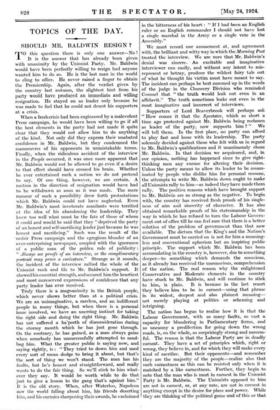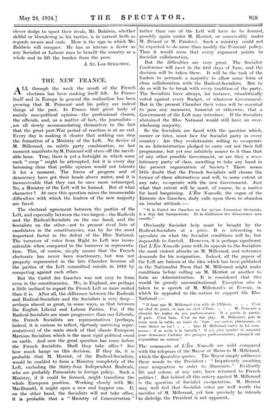TOPICS OF THE DAY.
SHOULD MR. BALDWIN RESIGN?
To this question there is only one answer—No ! It is the answer that has already been given with unanimity by the Unionist Party. Mr. Baldwin would have been perfectly willing to resign had anyone wanted him to do so. He is the last man in the world to cling to office. He never raised a finger to obtain the Premiership. Again, after the verdict given by the country last autumn, the slightest hint from his party would have produced an immediate and willing resignation. He stayed on as leader only because he was made to feel that he could not desert his supporters at a crisis.
When a fresh crisis had been engineered by a malevolent Press campaign, he would have been willing to go if all the best elements in the party had not made it quite clear that they would not allow him to do anything of the kind. Not only did they express their unabated confidence in Mr. Baldwin, but they condemned the manoeuvres of his opponents in unmistakable terms. Finally, when the ridiculous accident of the interview in the People occurred, it was once more apparent that Mr. Baldwin would not be allowed to go even if a desire to that effect should have crossed his brain. Whether he ever entertained such a notion we do not pretend to say. Of one thing, however, we are certain. A motion in the direction of resignation would have had to be withdrawn as soon as it was made. The mere rumour of such a possibility drew forth protestations which Mr. Baldwin could not have neglected. Even Mr. Baldwin's most inveterate assailants were terrified at the idea of his abandoning the leadership. They knew too well what must be the fate of those of whom it could and would be said that they "deprived the party of an honest and self-sacrificing leader just because he was honest and sacrificing." Such was the result of the - unfair Press campaign and the egregious blunder of an over-enterprising newspaper, coupled with the ignorance of a public man of the golden rule of publicity : "Always see proofs of an interview, or the complimentary portrait may prove a caricature." Strange as it sounds, the incident of the interview rallied the whole of the Unionist rank and file to Mr. Baldwin's support. It showed his essential strength, and secured him the heartiest and most unreserved expressions of confidence that any party leader has ever received.
Truly there is a magnanimity in the British people, which never shows better than at a political crisis. We are an unimaginative, a careless, and an indifferent people in many things, but when there is a personal issue involved, we have an unerring instinct for taking the right side and doing the right thing. Mr. Baldwin has not suffered a ha'porth of disconsideration during the stormy 'month which he has just gone through. On the contrary, he has gained, as a man always gains when somebody has unsuccessfully attempted to sand- bag him. What the greater public is saying now, and saying rightly, is : "They tried to down him and used every sort of mean dodge to bring it about, but that's the sort of thing we won't ,stand. The man has his faults, but he's honest and straightforward, and really wants to do the fair thing. So well stick to him what- ever they say. It would be worth while to do that just to give a lesson to the gang that's against him." It is the old story. -When, after Waterloo, Napoleon saw the world falling about him, his friends deserting him, and his enemies sharpening their swords, he exclaimed in the bitterness of his heart : " If I had been an English ruler or an English commander I should not have lost a single marshal in the Army or a single vote in the Assembly."
We must record our amusement at, and agreement with, the brilliant and witty way in which the Morning Past treated the interview. We are sure that Mr. Baldwin's denial was sincere. An excitable and imaginative interviewer can easily, and without any intent to mis- represent or betray, produce the wildest fairy tale out of what he thought his victim must have meant to say. The incident can perhaps be best summed up in the words of the judge in the Chancery Division who reminded Counsel that "the truth would leak out even in an affidavit." The truth sometimes leaks out even in the most imaginative and incorrect of interviews.
Supporters of Lord Beaverbrook will perhaps ask "How comes it that the Spectator, which so short a time ago protested against Mr. Baldwin being rechosen as leader of the party, now supports him ? " We will tell them. In the first place, no party can afford to play fast and loose with its leadership. The party solemnly decided against those who felt with us in regard to Mr. Baldwin's qualifications and it unanimously chose Mr. Baldwin. In that decision we acquiesced, and, in our opinion, nothing has happened since to give right- thinking men any excuse for altering their decision.
Unless the party means to allow its leader to be assass- inated by people who dislike him for personal reasons, the attempts to write Mr. Baldwin down ought to make all Unionists rally to him—as indeed they have made them rally. The positive reasons which have brought support to Mr. Baldwin are as strong as the negative. To begin with, the country has received fresh proofs of his single- ness of aim and sincerity of character. It has also obtained remarkable proofs of his statesmanship in the way in which he has refused to turn the Labour Govern- ment out of office till he can feel sure that there is a better solution of the problem of government than that now available. The dictum that the King's and the Nation's Government must be carried on is not for him a meaning- less and conventional aphorism but an inspiring public principle. The support which Mr. Baldwin has been accumulating in the country is, however, due to something deeper—to something which demands the conscious, as it already has received the unconscious, comprehension of the nation. The real reason why the enlightened Conservative and Moderate elements in the country have stuck to Mr. Baldwin, and will continue to stick to him, is plain. It is because in the last resort they believe him to be in earnest—using that phrase in its widest, deepest and also plainest meaning— not merely playing at politics or scheming and intriguing.
The nation has begun to realize how it is that the Labour Government, with so many faults, so vast a capacity for blundering in Parliamentary forms, and so uncanny a predilection for going down the wrong roads, is, on the whole, so surprisingly strong and success- ful. The reason is that the Labour Party are in deadly earnest. They have a set of principles which, right or wrong, they believe in, and for which they will make every kind of sacrifice. But their opponents—and remember they are the majority of the people—realize also that such earnestness as this can be resisted only when it is matched by a like earnestness. Further, they begin to note that the man who is most in earnest in the Unionist Party is Mr. Baldwin. The Unionists opposed to him are not in earnest, or, at any -rate, are not in earnest in anything except in the desire for place and power. While they-are thinking of the political game -and of this or that • clever dodge to upset their rivals, Mr. Baldwin, whether skilful or blundering in his tactics, is in earnest both as Tegards means and ends. Here is the sign in which Mr. Baldwin will conquer. He has as intense a desire as any Socialist or Labour man to benefit the country as a whole and to lift the burden from the poor.
J. ST. LOE STRACHEY.











































 Previous page
Previous page